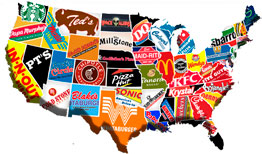 DineEquity, the parent company of IHOP & Applebees, is committed to going 100 percent cage-free in its egg supply chain. By 2025, all of the eggs served at the company’s U.S. restaurants will be cage-free. DineEquity first took steps to make its egg supply chain cage-free in 2008.
DineEquity, the parent company of IHOP & Applebees, is committed to going 100 percent cage-free in its egg supply chain. By 2025, all of the eggs served at the company’s U.S. restaurants will be cage-free. DineEquity first took steps to make its egg supply chain cage-free in 2008.IHOP and Applebees combined have thousands of restaurants in the U.S. that serve eggs everyday. IHOP, in particular, serves 65 different breakfast items, which include egg dishes. That means DineEquity can have a big impact on the egg supply chain in the U.S. through its embrace of cage-free eggs.
DineEquity is just one of many companies over the last few years that have decided to transition their egg supply chains to cage-free systems. Consumer expectations are driving the move. “As part of our ongoing commitment to animal welfare we determined that it was time to expand our commitment to cage free primarily because of consumer expectations,” Patrick Lenow, Vice President, Communications & Public Affairs, DineEquity told JustMeans.
“Marketing campaigns by animal welfare organizations have brought greater awareness to this aspect of animal welfare,” Lenow added. “This awareness has resonated with consumers and more and more consumers have an expectations of restaurants to offer cage-free eggs.”
The Humane Society of the U.S. (HSUS) is one of the animal welfare organizations that has brought awareness to consumers about the advantages to egg-laying hens of cage-free systems. Called battery cages, they are small spaces that hens live their entire lives in. Battery cages are just 67 square inches, smaller than a piece of letter-sized paper. Hens can’t spread their wings or engage in normal and natural chicken behaviors like nesting, perching, and dustbathing. Those are all things that experts say are important for the welfare of chickens.
Josh Balk, Senior Food Policy Director, HSUS said that consumer expectations and pressure are indeed driving companies to ditch cruel battery cages from their egg supply chains. “Companies simply can’t make any compelling case to their customers why hens should be crammed inside small, barren cages for their entire lives,” he told JustMeans. “When virtually every company is now going cage-free, to be an outlier is bad business and draws negative attention to the company. Consumers care about animals – if companies want to keep their customers they have to demonstrate they also care.”
Most companies that have committed to phasing in cage-free eggs have set dates that are years from now. There is a reason why it takes companies so long to go completely cage-free. “While I wish battery cages would be eliminated overnight, shifting an entire industry that uses 280 million animals a year to a new baseline production system takes time,” Balk said. He added that “there are renovations that are needed and new barns that have to be constructed.”
Within a decade battery cages will likely go the way of VCRs and cassette decks. “There should be very few battery cages left in this country within a decade,” Balk said. “The long history of this cruel and obscene production practice is coming to an end. And it couldn’t come soon enough.”
BY: Gina-Marie Cheeseman








Leave a comment